最新初中人教版九年级英语上册Unit 4句型语法
- 格式:doc
- 大小:28.50 KB
- 文档页数:2
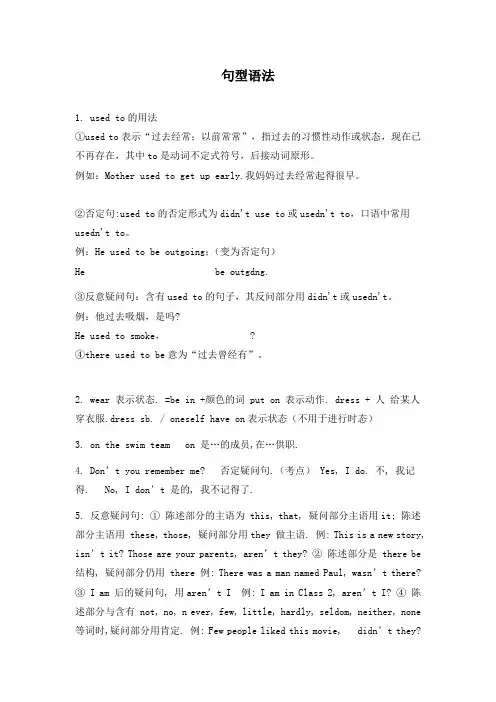
句型语法1. used to的用法①used to表示“过去经常;以前常常”,指过去的习惯性动作或状态,现在已不再存在,其中to是动词不定式符号,后接动词原形。
例如:Mother used to get up early.我妈妈过去经常起得很早。
②否定句:used to的否定形式为didn't use to或usedn't to,口语中常用usedn't to。
例:He used to be outgoing;(变为否定句)He be outgdng.③反意疑问句:含有used to的句子,其反问部分用didn't或usedn't。
例:他过去吸烟,是吗?He used to smoke,?④there used to be意为“过去曾经有”。
2. wear 表示状态. =be in +颜色的词 put on 表示动作. dress + 人给某人穿衣服.dress sb. / oneself have on表示状态(不用于进行时态)3. on the swim team on 是…的成员,在…供职.4. Don’t you remember me? 否定疑问句.(考点) Yes, I do. 不, 我记得. No, I don’t 是的, 我不记得了.5. 反意疑问句: ①陈述部分的主语为 this, that, 疑问部分主语用it; 陈述部分主语用 these, those, 疑问部分用they 做主语. 例: This is a new story, isn’t it? Those are your parents, aren’t they? ②陈述部分是 there be 结构, 疑问部分仍用 there 例: There was a man named Paul, wasn’t there?③ I am 后的疑问句, 用aren’t I 例: I am in Class 2, aren’t I? ④陈述部分与含有 not, no, n ever, few, little, hardly, seldom, neither, none 等词时,疑问部分用肯定. 例: Few people liked this movie, didn’t they?但陈述句中若带有否定前缀或后缀的单词时, 这个句子仍视为肯定, 后面仍用否定. 例: Your sister is unhappy, isn’t she? ⑤陈述部分的主语若为不定式或 V-ing 短语, 疑问部分主语用it. 例: To spend so much money on clothes is unnecessary, isn’t it? ⑥陈述句中主语是 nobody, no one, everyone, everybody 等指人的不定代词时,疑问部分用they做主语; 若陈述部分主语是 something, anything, noting, everything 等指事物的不定代词时, 疑问部分用it 做主语. 例: Nobody says one word about the accident, do they? Everything seems perfect, doesn’t it? ⑦当主语是第一人称I时, 若谓动为think, believe, guess 等词时, 且其后跟宾丛,这时疑问句部分的人称, 时态要与宾语从句保持一致, 同时还要考虑否定转移. 例: I don’t think he can finish the work in time, can he? ⑧前面是祈使句, 后用 will you? (let’s 开头时, 后用shall we?)。

九上英语人教版第四单元知识点一、重点单词。
1. humorous.- 形容词,意为“有幽默感的;滑稽有趣的”。
例如:The teacher is very humorous and we all like his classes.(这位老师很幽默,我们都喜欢他的课。
)- 其名词形式是“humor”,意为“幽默”。
2. silent.- 形容词,“不说话的;沉默的”。
例如:He remained silent all the time.(他一直保持沉默。
)- 相关短语“keep silent”(保持沉默)。
其名词形式是“silence”,例如:The silence in the room made me nervous.(房间里的寂静让我紧张。
)3. helpful.- 形容词,“有用的;有帮助的”。
例如:This book is very helpful for my study.(这本书对我的学习很有帮助。
)4. score.- 作名词时,意为“得分;进球”。
例如:His score in the math test is very high.(他在数学考试中的分数很高。
)- 作动词时,意为“得分;进球”。
例如:He scored two goals in the football match.(他在足球比赛中进了两个球。
)5. background.- 名词,“背景”。
例如:His family background is very ordinary.(他的家庭背景很普通。
)6. interview.- 作名词时,“面试;访谈;采访”。
例如:I have an interview tomorrow.(我明天有一个面试。
)- 作动词时,“采访;面试;对……进行面谈”。
例如:The reporter interviewed the famous singer.(记者采访了那位著名的歌手。
)7. dare.- 作实义动词时,意为“敢于;胆敢”,有人称和数以及时态的变化,后接动词不定式。

Unit 4 I used to be afraid of the dark知点解1. from time to time常;有,和sometimes, at times 是同表达。
常的 time 短有:what time 几点for the first time第一次all the time一直,是;at times 不,有in time及;on time 按,准at the same time 同have a good/great/wonderful time 玩得开心3.It ’ s been three years since we last saw our primary school classmates.It has been+一段 +since+含有去式的述句“自⋯ 以来已多了”. 我在里工作已有一个半月了。
1、 I’m looking after Tom today. He ’s been in my house ________ 8:00 this morning.A. atB.sinceC.forD.till2、 Shared bikes, which are environmentally friendly, _____ quite popular among big cities in China since last April.A.becameB.have becomeC.will become3、 ---Where is Jane?---I don ’tknow. I ________ her since yesterday morning.A. haven’tseenB.didn ’tseeC.won’tsee4、 Since we began to use the Internet, our lives _________ a lot.A. changeB.had changedC.will changeD.have changed4. I used to see him reading in the library every day.see sb. do sth . 看某人做了某事指整个程即:指作常生或完成。

人教版九年级上册第四单元语法知识点梳理Unit 4:I used to be afraid of the dark.第四单元的语法重点是:used to的用法;if引导条件状语从句;few和little。
used to的用法:used to是一个固定结构,意为“过去经常;以前常常”,其后接动词原形。
它表示过去存在某种状态或者过去的某种经常性、习惯性的行为或者动作。
★其用于肯定句的结构为:主语+used to+动词原形+其他。
如:I used to play ping-pong with my brother.过去我常常和我哥哥一起打乒乓球。
★其用于否定句的结构为:主语+didn't+use to+动词原形。
如:You didn't use to like action movies.你过去不喜欢动作片。
★其用于一般疑问句的结构为:Did+主语+use to+动词原形+其他?如:Did your sister use to be shy?你的妹妹过去害羞吗?【辨析:】be used to(doing)sth意为“习惯于(做)某事”,to后可接名词、代词或动名词。
如:The students are used to the new teacher now.学生们现在习惯这个新老师了。
They are used to raising their hands first when they want to ask questions.他们习惯了问问题前先举手。
if引导条件状语从句:★if引导的非真实性条件状语从句即虚拟语气,通过动词形式的变化来表示说话人对发生的动作或存在的状态所持的态度或看法的动词形式称为语气,虚拟语气表示说话人所说的话不是事实,而是一种祝愿,建议或是与事实相反的假设等。
★if引导的条件状语从句分为真实和非真实条件句,非真实条件句应用虚拟语气。
如果要表示与现在或将来事实相反时,其虚拟语气结构为:句型条件从句主句谓语动词形式动词过去式(be动词用were)would动词原形即:(从句)if主语+动词过去式(be动词用were),一般过去时(主句)主语+would+动词原形过去将来时。
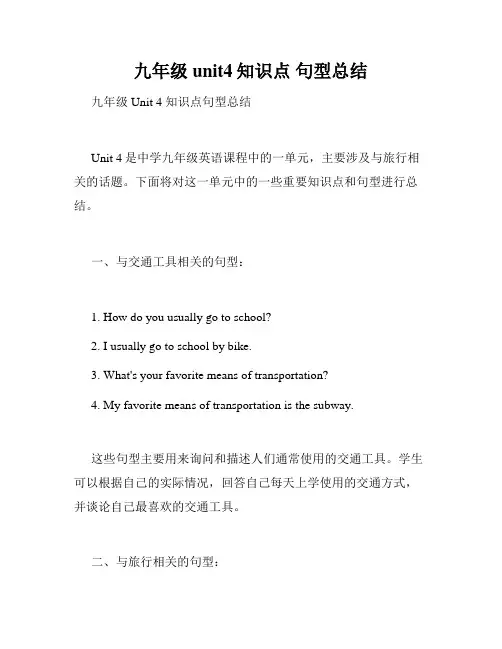
九年级unit4知识点句型总结九年级Unit 4 知识点句型总结Unit 4是中学九年级英语课程中的一单元,主要涉及与旅行相关的话题。
下面将对这一单元中的一些重要知识点和句型进行总结。
一、与交通工具相关的句型:1. How do you usually go to school?2. I usually go to school by bike.3. What's your favorite means of transportation?4. My favorite means of transportation is the subway.这些句型主要用来询问和描述人们通常使用的交通工具。
学生可以根据自己的实际情况,回答自己每天上学使用的交通方式,并谈论自己最喜欢的交通工具。
二、与旅行相关的句型:1. Have you ever been to Beijing?2. Yes, I have been to Beijing.3. No, I have never been to Beijing.4. What do you think of the Great Wall?5. I think the Great Wall is amazing.这些句型涉及到对旅行经历和旅游景点的讨论。
学生可以描述自己去过的地方,也可以表达对某些景点的看法。
三、与旅行计划相关的句型:1. Where are you going for your summer vacation?2. I am going to Hainan for my summer vacation.3. What are you planning to do there?4. I am planning to go swimming and explore the local culture.这些句型用于询问和描述学生暑假计划的目的地和计划活动。

英语九年级上人教新课标unit4 知识汇总一.used to 去曾pay for (sth.)付、支付find out 找到、提出(答案、解决的方法)think of 、想起get ⋯back 退⋯、送回pick up 起have a tryall over 遍布large number of 多no matter 不both ⋯ and 二者都give up 放弃ever since 从那起、今后向来so far 到当前止come trueslow down 减、减速be proud of 以骄傲not only ⋯ but also 不⋯并且be afraid of 惧怕cut down 砍倒as soon as possible 尽可能快的keep on doing sth. 向来做某事one-way 程的be amazed at ⋯感觉惊clean up 消除、整理干as long as 达on earth 终究practise doing sth. 做某事What a pity! 多惋惜!take part in 参加because of 因二.要点句型及用法1.Have you got any brothers or sisters?2.She used to be a history teacher.3.One day the librarian came up with an idea.4.No matter what the weather is like you can always find surfers out riding the waves.5.Whenever someone throws in some rubbish, it produces a piece of music.6.It ’ s a pleasant way to help keep our city clean.7.Taking care of our vironment is very important.8.It ’ s our duty to keep our environment clean and tidy.9.The more trees, the better.10.Make sure that all of the rubbish goes into the dustbin.11.I hope to see you as soon as possible.12.I ’ m free except today.13.In the south of the island, there is scuba diving, fishing and boating.14.It takes about twelve hours if you take k37 train.15.That ’ s a deal.三. 考点:1.pay, cost, spend, takeA. pay v. ⋯ 酬, pay for ⋯付款pay money for 花⋯B.cost 某物花(某人)多少The new radio cost her twenty yuan.C. spend 指花和金I usually spend 300 yuan on newspapers every year.Tom spent one hour playing football yesterday.D.take 做某事花(某人)多少It takes us twenty minutes to write down the new words.ed to, be used toWhen I was a child, I used to climb that hill.We are used to the weather here.我已适了的天气。
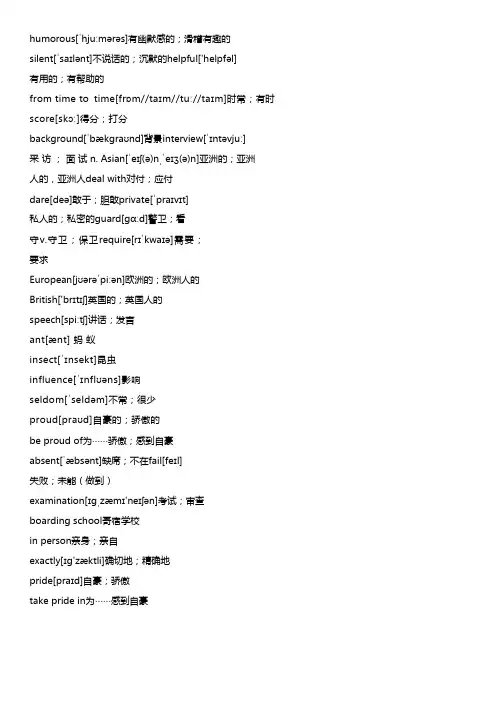
humorous[ˈhjuːmərəs]有幽默感的;滑稽有趣的silent[ˈsaɪlənt]不说话的;沉默的helpful['helpfəl]有用的;有帮助的from time to time[frɒm//taɪm//tuː//taɪm]时常;有时score[skɔː]得分;打分background[ˈbækɡraʊnd]背景interview[ˈɪntəvjuː]采访;面试 n. Asian[ˈeɪʃ(ə)nˌˈeɪʒ(ə)n]亚洲的;亚洲人的,亚洲人deal with对付;应付dare[deə]敢于;胆敢private[ˈpraɪvɪt]私人的;私密的guard[ɡɑːd]警卫;看守v.守卫;保卫require[rɪˈkwaɪə]需要;要求European[jʊərəˈpiːən]欧洲的;欧洲人的British['brɪtɪʃ]英国的;英国人的speech[spiːtʃ]讲话;发言ant[ænt]蚂蚁insect[ˈɪnsekt]昆虫influence[ˈɪnflʊəns]影响seldom[ˈseldəm]不常;很少proud[praʊd]自豪的;骄傲的be proud of为⋯⋯骄傲;感到自豪absent[ˈæbsənt]缺席;不在fail[feɪl]失败;未能(做到)examination[ɪgˌzæmɪ'neɪʃən]考试;审查boarding school寄宿学校in person亲身;亲自exactly[ɪg'zæktli]确切地;精确地pride[praɪd]自豪;骄傲take pride in为⋯⋯感到自豪grandson[ˈɡrændsʌn]孙子;外孙general[ˈdʒenər(ə)l]普遍的;常规的;总的将军introduction[ɪntrəˈdʌkʃ(ə)n]介绍Paula 葆拉(女名)Alfred 艾尔弗雷德(男名)Billy 比利(男名)Candy 坎迪(女名)Jerry 杰里(男名);杰丽(女名)Emily 埃米莉(女名)02 U n i t 4 知识梳理Unit4 I used to be afraid of the dark.【重点短语】ed to do 过去常常做2.deal with 对付应付3.be proud of 为……骄傲,感到自豪4.take pride in 为……感到自豪5.fromtime to time 时常,有时6.i n public 公开地7.i n person 亲身,亲自8.t ake up sth 开始做,接受,占用9.not……anymore不再10.worry about 为……担忧11.hang out 闲逛12.thinkabout 考虑13.be alone 独处14.on the soccer team 在足球队15.no longer 不再16.make a decision 做决定17.to one’s surprise 令某人吃惊的是18.even though 尽管19.pay attention to 对……注意,留心20.in the last few years 在过去的几年里21.be afraid of 害怕22.turn red 变红23.tons of attention 很多关注24.be careful 当心25.give up 放弃26.a very small number of …极少数的……27.give a speech 作演讲28.all the time 一直总是29.be interested in 对……感兴趣30.change one’s life 改变某人的生活31.take care of 照顾32.one of…, ……之一【重点句型】1. I used to be afraid of the dark. 我过去常常前害怕黑暗.2.I go to sleep with my bedroom light on. 我开着卧室的灯睡觉.3.I used to spend a lot of time playing games with my friends. 以前我常常花很多时间和我的朋友们玩游戏.4.I hardly ever have time for concerts.我几乎没有时间去听音乐会.5.My life has changed a lot in the last few years.我的生活在过去几年里改变了很多.6.It will make you stressed out.那会使你紧张的.7.It seems that Yu Mei has changed a lot.玉梅似乎变化很大.03词汇精讲1.silentsilent是形容词,意为“沉默的;无言的”,其名词形式为silence。
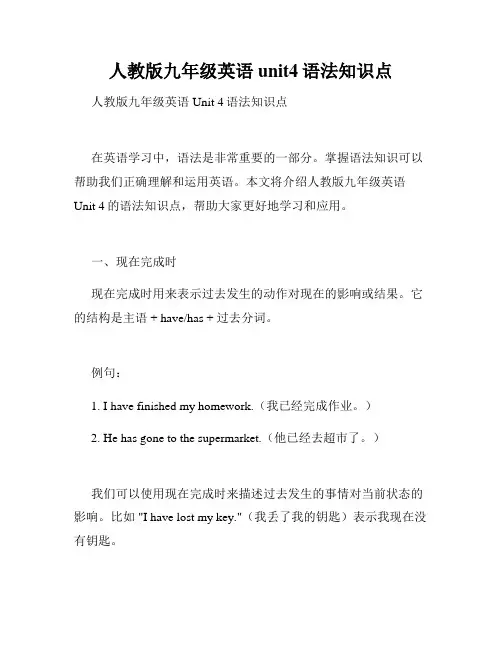
人教版九年级英语unit4语法知识点人教版九年级英语Unit 4语法知识点在英语学习中,语法是非常重要的一部分。
掌握语法知识可以帮助我们正确理解和运用英语。
本文将介绍人教版九年级英语Unit 4的语法知识点,帮助大家更好地学习和应用。
一、现在完成时现在完成时用来表示过去发生的动作对现在的影响或结果。
它的结构是主语 + have/has + 过去分词。
例句:1. I have finished my homework.(我已经完成作业。
)2. He has gone to the supermarket.(他已经去超市了。
)我们可以使用现在完成时来描述过去发生的事情对当前状态的影响。
比如 "I have lost my key."(我丢了我的钥匙)表示我现在没有钥匙。
二、情态动词情态动词用来表示说话者对某个动作或状态的态度、可能性、允许性等。
常见的情态动词有 can, could, may, might(可以)、must(必须)、shall, should(应该)、will, would, need等。
例句:1. You can go to the party.(你可以去参加派对。
)2. He must finish his homework before playing games.(他必须先做完作业再玩游戏。
)情态动词有一些特点:后面接动词原形,表示客观的态度或可能性;情态动词本身没有人称和数的变化;句子中情态动词和动词基本形的变化最小。
三、虚拟语气虚拟语气用来表示非真实或假设的情况。
在条件从句中,用虚拟语气来表示可能不会实现的愿望、假设或建议等。
常见的虚拟语气形式有:would/could/might +动词原形。
例句:1. If I were a bird, I would fly in the sky.(如果我是一只鸟,我会在天空飞翔。
)2. I wish I could go with you.(我希望我能和你一起去。
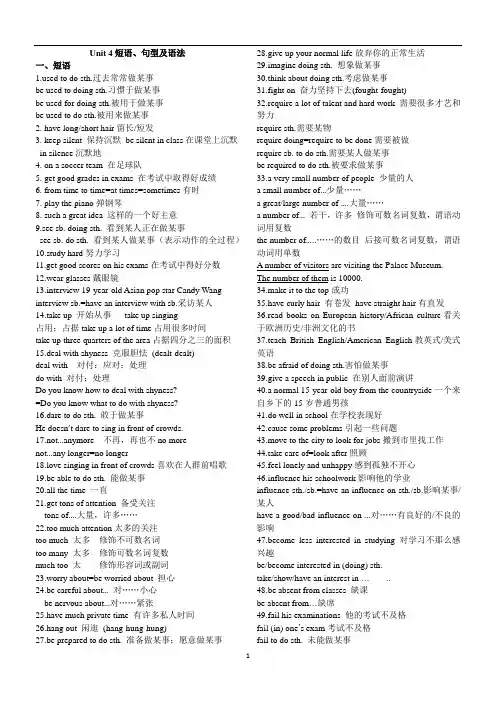
Unit 4短语、句型及语法一、短语ed to do sth.过去常常做某事be used to doing sth.习惯于做某事be used for doing sth.被用于做某事be used to do sth.被用来做某事2. have long/short hair留长/短发3. keep silent 保持沉默be silent in class在课堂上沉默in silence沉默地4. on a soccer team 在足球队5. get good grades in exams 在考试中取得好成绩6. from time to time=at times=sometimes有时7. play the piano弹钢琴8. such a great idea 这样的一个好主意9.see sb. doing sth. 看到某人正在做某事see sb. do sth. 看到某人做某事(表示动作的全过程)10.study hard努力学习11.get good scores on his exams在考试中得好分数12.wear glasses戴眼镜13.interview 19-year-old Asian pop star Candy Wang interview sb.=have an interview with sb.采访某人14.take up 开始从事take up singing占用;占据take up a lot of time占用很多时间take up three quarters of the area占据四分之三的面积15.deal with shyness 克服胆怯(dealt-dealt)deal with 对付;应对;处理do with 对付;处理Do you know how to deal with shyness?=Do you know what to do with shyness?16.dare to do sth. 敢于做某事He doesn’t dare to sing in front of crowds.17.not…anymore 不再,再也不no morenot…any longer=no longer18.love singing in front of crowds喜欢在人群前唱歌19.be able to do sth. 能做某事20.all the time 一直21.get tons of attention 备受关注tons of….大量,许多……22.too much attention太多的关注too much 太多修饰不可数名词too many 太多修饰可数名词复数much too 太修饰形容词或副词23.worry about=be worried about 担心24.be careful about…对……小心be nervous about…对……紧张25.have much private time 有许多私人时间26.hang out 闲逛(hang-hung-hung)27.be prepared to do sth. 准备做某事;愿意做某事28.give up your normal life放弃你的正常生活29.imagine doing sth. 想象做某事30.think about doing sth.考虑做某事31.fight on 奋力坚持下去(fought-fought)32.require a lot of talent and hard work 需要很多才艺和努力require sth.需要某物require doing=require to be done需要被做require sb. to do sth.需要某人做某事be required to do sth.被要求做某事33.a very small number of people 少量的人a small number of…少量……a great/large number of ….大量……a number of…若干,许多修饰可数名词复数,谓语动词用复数the number of…..……的数目后接可数名词复数,谓语动词用单数A number of visitors are visiting the Palace Museum.The number of them is 10000.34.make it to the top成功35.have curly hair 有卷发have straight hair有直发36.read books on European history/African culture看关于欧洲历史/非洲文化的书37.teach British English/American English教英式/美式英语38.be afraid of doing sth.害怕做某事39.give a speech in public 在别人面前演讲40.a normal 15-year-old boy from the countryside一个来自乡下的15岁普通男孩41.do well in school在学校表现好42.cause some problems引起一些问题43.move to the city to look for jobs搬到市里找工作44.take care of=look after照顾45.feel lonely and unhappy感到孤独不开心46.influence his schoolwork影响他的学业influence sth./sb.=have an influence on sth./sb.影响某事/某人have a good/bad influence on ...对……有良好的/不良的影响47.become less interested in studying 对学习不那么感兴趣be/become interested in (doing) sth.take/show/have an interest in …..48.be absent from classes 缺课be absent from…缺席49.fail his examinations 他的考试不及格fail (in) one’s exam考试不及格fail to do sth. 未能做某事150.make the/a decision to do sth. 决定做某事=decide to do sth.=make up one’s mind to do sth.make one’s own decision自己做决定make important decisions做重要的决定51.send him to a boarding school 送他到寄宿学校52.make friends 交朋友make friends with sb.与某人交朋友be friends with sb.成为某人的朋友53.find life there difficult发觉那儿的生活艰难54.advise sb. to do sth.建议某人做某事55.in person亲自56.take a 24-hour train and a 5-hour bus ride to get to Li Wen’s school 乘坐24小时的火车,5小时的汽车到李文的学校57.even though/if 即使58.take pride in 以……为自豪59.have much more communication with sb.与某人有更多的交流60.become more outgoing变得更外向61.join the school basketball team加入校篮球队62.become active in many other activities在许多其它的活动上变得更积极63.be proud of 以……为自豪=take pride in64.have a long talk进行长谈65.remain silent保持沉默keep silent66.most of the time大多数时间67.help his students win the English competition 帮助他的学生赢得英语竞赛help sb. (to) do sth./help sb. with sth.68.have a great influence on sb. 对某人影响大69.tell us interesting jokes 给我们讲有趣的笑话70.give a general self-introduction in a job interview在面试中作简要的自我介绍71.play well in the basketball game在篮球比赛中打得好72.in the last few years在过去的几年中/ in the past twenty years 在过去的20年Great changes have taken place in the past twenty years. My hometown has changed a lot in the past twenty years.二、句型1.I used to be afraid of the dark.我过去害怕黑暗。
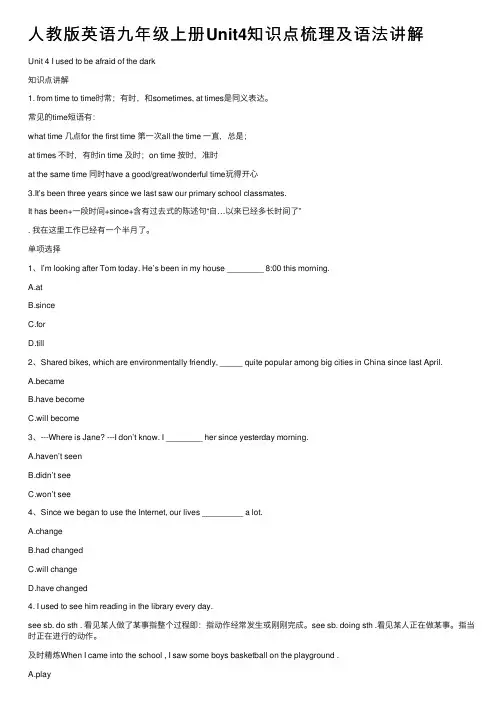
⼈教版英语九年级上册Unit4知识点梳理及语法讲解Unit 4 I used to be afraid of the dark知识点讲解1. from time to time时常;有时,和sometimes, at times是同义表达。
常见的time短语有:what time ⼏点for the first time 第⼀次all the time ⼀直,总是;at times 不时,有时in time 及时;on time 按时,准时at the same time 同时have a good/great/wonderful time玩得开⼼3.It’s been three years since we last saw our primary school classmates.It has been+⼀段时间+since+含有过去式的陈述句“⾃…以来已经多长时间了”. 我在这⾥⼯作已经有⼀个半⽉了。
单项选择1、I’m looking after Tom today. He’s been in my house ________ 8:00 this morning.A.atB.sinceC.forD.till2、Shared bikes, which are environmentally friendly, _____ quite popular among big cities in China since last April.A.becameB.have becomeC.will become3、---Where is Jane? ---I don’t know. I ________ her since yesterday morning.A.haven’t seenB.didn’t seeC.won’t see4、Since we began to use the Internet, our lives _________ a lot.A.changeB.had changedC.will changeD.have changed4. I used to see him reading in the library every day.see sb. do sth . 看见某⼈做了某事指整个过程即:指动作经常发⽣或刚刚完成。
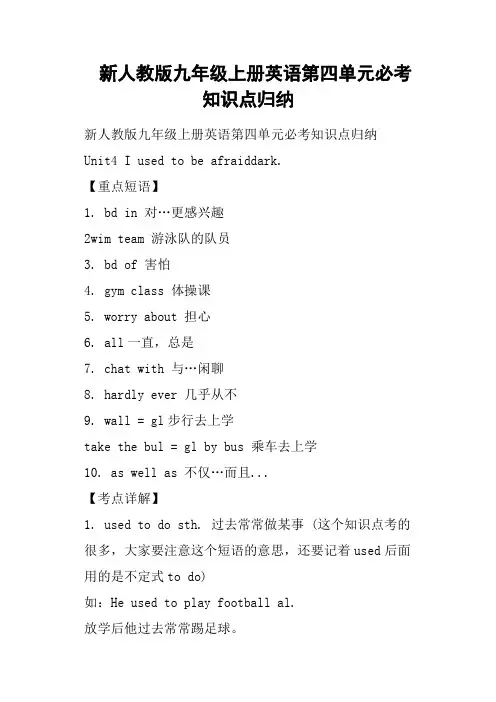
新人教版九年级上册英语第四单元必考知识点归纳新人教版九年级上册英语第四单元必考知识点归纳Unit4 I used to be afraiddark.【重点短语】1. bd in 对…更感兴趣2wim team 游泳队的队员3. bd of 害怕4. gym class 体操课5. worry about 担心6. all一直,总是7. chat with 与…闲聊8. hardly ever 几乎从不9. wall = gl步行去上学take the bul = gl by bus 乘车去上学10. as well as 不仅…而且...【考点详解】1. used to do sth. 过去常常做某事 (这个知识点考的很多,大家要注意这个短语的意思,还要记着used后面用的是不定式to do)如:He used to play football al.放学后他过去常常踢足球。
2. plaano 弹钢琴(play后面如果跟西洋乐器,大家记住,中间要加the,如果是中国乐器,不加the,如:play erhu)3. ①bd对…感兴趣②bd in doing sth. 对做…感兴趣(对于这两个用法大家一定要掌握,切记切记)如:Hd in math, bu'd in speaking English. 他对数学感兴趣,但是他对说英语不感兴趣。
d adj. 感兴趣的,指人对某事物感兴趣,往往主语是人g adj.有趣的,指某事物/某人具有趣味,主语往往是物(对于d和g要区分清楚,一个主语往往是人,一个主语往往是物)5. bd害怕…… 如:I addog.bd of doing sth. 害怕做…… 如:I ad of speakingd 动词,表示“花费金钱、时间”(spend和pay for它们的主语都是人,这一点大家要清楚)①spend…在某事上花费(金钱、时间)(重要考点)②spend…(in)doing sth. 花费(金钱、时间)去做某事(重要考点,尤其要注意动名词,也就是动词的ing 形式)如:He spends too mulothes. 他花费太多的时间在衣着上。
人教版九年级英语上Unit4单词、知识梳理、词汇句式精讲一、Unit4 单词humorous [ˈhjuːmərəs] 有幽默感的;滑稽有趣的silent [ˈsaɪlənt] 不说话的;沉默的helpful ['helpfəl] 有用的;有帮助的from time to time [frɒm//taɪm//tuː//taɪm] 时常;有时score [skɔː] 得分;打分background [ˈbækɡraʊnd] 背景interview [ˈɪntəvjuː] 采访;面试n.Asian [ˈeɪʃ(ə)nˌˈeɪʒ(ə)n] 亚洲的;亚洲人的,亚洲人deal with 对付;应付dare [deə] 敢于;胆敢private [ˈpraɪvɪt] 私人的;私密的guard [ɡɑːd] 警卫;看守v.守卫;保卫require [rɪˈkwaɪə] 需要;要求European [jʊərəˈpiːən] 欧洲的;欧洲人的British ['brɪtɪʃ] 英国的;英国人的speech [spiːtʃ] 讲话;发言ant [ænt] 蚂蚁insect [ˈɪnsekt] 昆虫influence [ˈɪnflʊəns] 影响seldom [ˈseldəm] 不常;很少proud [praʊd] 自豪的;骄傲的be proud of 为⋯⋯骄傲;感到自豪absent [ˈæbsənt] 缺席;不在fail [feɪl] 失败;未能(做到)examination [ɪgˌzæmɪ'neɪʃən] 考试;审查boarding school 寄宿学校in person 亲身;亲自exactly [ɪg'zæktli] 确切地;精确地pride [praɪd] 自豪;骄傲take pride in 为⋯⋯感到自豪grandson [ˈɡrændsʌn] 孙子;外孙general [ˈdʒenər(ə)l] 普遍的;常规的;总的将军introduction [ɪntrəˈdʌkʃ(ə)n] 介绍Paula 葆拉(女名)Alfred 艾尔弗雷德(男名)Billy 比利(男名)Candy 坎迪(女名)Jerry 杰里(男名);杰丽(女名)Emily 埃米莉(女名)二、Unit4 知识梳理Unit4 I used to be afraid of the dark.【重点短语】ed to do 过去常常做2.deal with 对付应付3.be proud of 为……骄傲,感到自豪4.take pride in 为……感到自豪5.from time to time 时常,有时6.in public 公开地7.in person 亲身,亲自8.take up sth 开始做,接受,占用9.not……anymore 不再10.worry about 为……担忧11.hang out 闲逛12.think about 考虑13.be alone 独处14.on the soccer team 在足球队15.no longer 不再16.make a decision 做决定17.to one’s surprise 令某人吃惊的是18.even though 尽管19.pay attention to 对……注意,留心20.in the last few years 在过去的几年里21.be afraid of 害怕22.turn red 变红23.tons of attention 很多关注24.be careful 当心25.give up 放弃26.a very small number of …极少数的……27.give a speech 作演讲28.all the time 一直总是29.be interested in 对……感兴趣30.change one’s life 改变某人的生活31.take care of 照顾32.one of…, ……之一【重点句型】1. I used to be afraid of the dark.我过去常常前害怕黑暗.2.I go to sleep with my bedroom light on.我开着卧室的灯睡觉.3. I used to spend a lot of time playing games with my friends.以前我常常花很多时间和我的朋友们玩游戏.4. I hardly ever have time for concerts.我几乎没有时间去听音乐会.5. My life has changed a lot in the last few years.我的生活在过去几年里改变了很多.6. It will make you stressed out.那会使你紧张的.7. It seems that Yu Mei has changed a lot.玉梅似乎变化很大.三、词汇精讲1. silentsilent是形容词,意为“沉默的;无言的”,其名词形式为silence。
新人教版九年级上册英语第四单元必考知识点归纳Unit4Iusedtobeafraidofthedar.【重点短语】beoreinterestedin对…更感兴趣onthesitea游泳队的队员beterrifiedof害怕gyclass体操orryabout担心allthetie一直,总是chatith与…闲聊hardlyever几乎从不altoschool=gotoschoolonfoot步行去上学taethebustoschool=gotoschoolbybus乘车去上学0.asellas不仅…而且...【考点详解】usedtodosth.过去常常做某事如:Heusedtoplayfootballafterschool.放学后他过去常常踢足球。
playthepiano弹钢琴①beinterestedinsth.对…感兴趣②beinterestedindoingsth.对做…感兴趣如:Heisinterestedinath,butheisn'tinterestedinspeaingEn glish.他对数学感兴趣,但是他对说英语不感兴趣。
interestedad感兴趣的,指人对某事物感兴趣,往往主语是人interestingad有趣的,指某事物/某人具有趣味,主语往往是物beterrifiedofsth.害怕……如:Iaterrifiedofthedog.beterrifiedofdoingsth.害怕做……如:Iaterrifiedofspeaing.spend动词,表示“花费金钱、时间”①spend…onsth.在某事上花费②spend…doingsth.花费去做某事如:Hespendstoouchtieonclothes.他花费太多的时间在衣着上。
Hespend3onthsbuildingthebridge.他花费了三个月去建这座桥。
tae:动词,有“花费时间”的意思,常用的结构有:Ittaessbtodosth.做某事花费某人多长时间。
Unit 4 I used to be afraid of the dark重点短语和句型一、重点短语Section Ahave straight hair / curly hair 留着直发/ 卷发have short hair/ long hair 留着短发/ 长发be silent in class 在课堂上保持沉默be interested in ... 对……感兴趣on a basketball team 在篮球队from time to time 时常;有时turn red 变红get good scores on the exams 在考试中取得好成绩wear glasses 戴着眼镜take up singing 开始唱歌deal with her shyness 克服她的羞怯dare to do sth. 敢做某事not ... anymore 不再……in front of crowds 在众人面前all the time 频繁;反复get tons of attention 被众人所关注;吸引无数目光worry about ... / be worried about ...担心……;担忧……be careful about ... 对……小心private time 私人时间hang out with friends 和朋友们闲逛give up your normal life 放弃你正常的生活the road to success 成功之路fight on 奋力坚持下去;继续战斗require a lot of talent and hard work 需要很大的天赋和勤奋make it to the top 成功;出人头地give a speech 发表演讲in public 公开地;在别人面前Section Bbe nervous about tests 考试紧张do well in school 在学校表现好cause problems 制造麻烦move to the city 搬到城市look for jobs 找工作take care of sb. 照顾某人miss his parents 想念他的父母feel lonely and unhappy 感到孤独和不开心influence his schoolwork 影响他的学业be absent from classes 缺课;缺勤fail his examinations 他的考试不及格make the decision to do sth. 决定做某事make friends 交朋友leave the school 离开学校advise sb. to do sth. 建议某人做某事in person 亲身;亲自take a 24-hour train ride 乘坐24个小时的火车even though 即使;虽然think of sb. 想起某人take pride in / be proud of 为……骄傲;为……感到自豪become active in many other activities 在许多别的活动中变得积极have a long talk 长谈send sb. to a boarding school 将某人送到一所寄宿学校二、重点句型Section A1.Did Mario use to be short ? 马里奥过去很矮吗?2.She took up singing to deal with her shyness . 她开始唱歌以解决羞涩问题。
Unit 4 .ed to be 过去常常(暗指现在没有发生)be used to doing sth 习惯于```2.wear穿戴,wear glasses, wear a hat3.in+颜色,穿·in red.4.from time to time=sometimes/ at times 有时5.be helpful to doing.6.see sb doing sth看见某人正在做某事7.do with 处理,一般后面跟what,(what to do with) 8 .deal with 处理。
一般用how.(how to deal with)9.take up doing sth 开始做某事。
9.all the time一直10.not```anymore 不再···11.worry about 担心12.be prepared to do sth准备做某事13.be prepared for sth为某事做好准备。
14.give up doing sth 放弃15.tons of 许多,大量,get tons of attention 获得大量关注16.hang out with sb 与某人闲逛。
17.think about doing sth考虑18.a number of +复数许多,大量,后用复数19.the number of```的数量,后用单数eg The number of students in our class is 28./ A number of students are playing cards 20.make it 成功21.be good at =do well in 擅长22.be always doing sth 总是做某事23.It is hard to believe that ```难以想象···24.look for 寻找25.take care of 照顾26.have an influence on sth 对···有影响。
人教版九年级英语u4语法知识点九年级英语是初中阶段的最后一年,也是英语学习的关键时期。
在这个阶段,学生要掌握更多的语法知识点,以提高英语的表达能力。
本文将介绍人教版九年级英语第四单元的一些重要语法知识点。
一、时态的使用在九年级英语中,时态的使用非常重要。
主要包括一般现在时、一般过去时、一般将来时以及现在进行时等。
1. 一般现在时用于描述客观事实、常规行为和永恒真理等。
例如:I go to school every day.2. 一般过去时用于描述过去发生的事情或状态。
例如:He played basketball yesterday.3. 一般将来时用于表示将来发生的动作或状态。
例如:Theywill go to the park tomorrow.4. 现在进行时用于描述现在正在进行的动作。
例如:She is watching TV now.二、被动语态的构成和使用被动语态在九年级英语中也是一个重要的语法知识点。
它由助动词be和过去分词构成,用于强调动作的承受者而不是执行者。
例如:The letter was written by Tom.(这封信是汤姆写的。
)被动语态的使用在日常生活中比较常见,特别是在新闻报道、科学实验以及一些说明书中。
三、虚拟语气的使用虚拟语气在九年级英语中也是一个难点。
它用于表示与事实相反或不可能发生的情况,或者用于表示建议、要求、命令和惊讶等情感。
虚拟语气的构成包括过去式的虚拟、与过去事实相反的过去完成时虚拟以及与现在事实相反的虚拟。
例如:I wish I had a car.(我希望我有一辆车。
)虚拟语气的使用需要注意时态和语气的变化,所以在学习时要多加练习和掌握。
四、非谓语动词的分类和用法非谓语动词包括不定式、动名词和动词的现在分词和过去分词形式。
非谓语动词在九年级英语中也是一个重要的语法知识点。
1. 不定式用于表示目的、结果、原因、方式等。
例如:I want to buy a new book.(我想买一本新书。
unit4九年级上册英语知识点Unit 4 九年级上册英语知识点导语:九年级上册英语Unit 4涵盖了一些重要的语法和词汇知识点。
本文将介绍这些知识点,并提供一些有趣的例句和练习,帮助同学们更好地掌握。
一、一般现在时1. 用法:表示经常性或习惯性的动作或状态。
例句:I usually go to school by bus.He plays basketball every Sunday.2. 注意事项:第三人称单数的一般现在时动词要加-s或-es结尾。
例句:She loves singing.He often takes a walk after dinner.二、一般过去时1. 用法:表示在过去某个时间发生的动作或存在的状态。
例句:We visited the museum yesterday.I lived in France for three years.2. 注意事项:一般过去时的肯定句句子结构为“主语+动词的过去式”,否定句和疑问句使用助动词did。
例句:She didn't go to the party last night.Did you watch the movie last weekend?三、情态动词can和could1. 用法:表示能力、允许、请求、建议等意义。
例句:I can swim very well.Could you please open the window?2. 注意事项:can表示现在的能力或允许,could表示过去的能力或允许,也可以表示提出请求或建议。
例句:When I was young, I could run faster.Could you please lend me a pencil?四、现在进行时1. 用法:表示现在(讲话瞬间)正在进行的动作或发生的事情。
例句:She is reading a book right now.They are watching a movie at the cinema.2. 注意事项:现在进行时句子结构为“主语+be动词(am, is, are)+动词的现在分词”。
句型语法
1. used to的用法
①used to表示“过去经常;以前常常”,指过去的习惯性动作或状态,现在已不再存在,其中to是动词不定式符号,后接动词原形。
例如:Mother used to get up early.我妈妈过去经常起得很早。
②否定句:used to的否定形式为didn't use to或usedn't to,口语中常用usedn't to。
例:He used to be outgoing;(变为否定句)
He be outgdng.
③反意疑问句:含有used to的句子,其反问部分用didn't或usedn't。
例:他过去吸烟,是吗?
He used to smoke,?
④there used to be意为“过去曾经有”。
2. wear 表示状态. =be in +颜色的词 put on 表示动作. dress + 人给某人穿衣服.dress sb. / oneself have on表示状态(不用于进行时态)
3. on the swim team on 是…的成员,在…供职.
4. Don’t you remember me? 否定疑问句.(考点) Yes, I do. 不, 我记得. No, I don’t 是的, 我不记得了.
5. 反意疑问句: ①陈述部分的主语为 this, that, 疑问部分主语用it; 陈述部分主语用 these, those, 疑问部分用they 做主语. 例: This is a new story, isn’t it? Those are your parents, aren’t they? ②陈述部分是 there be 结构, 疑问部分仍用 there 例: There was a man named Paul, wasn’t there?
③ I am 后的疑问句, 用aren’t I 例: I am in Class 2, aren’t I? ④陈述部分与含有 not, no, n ever, few, little, hardly, seldom, neither, none 等词时,疑问部分用肯定. 例: Few people liked this movie, didn’t they?
但陈述句中若带有否定前缀或后缀的单词时, 这个句子仍视为肯定, 后面仍用
否定. 例: Your sister is unhappy, isn’t she? ⑤陈述部分的主语若为不定式或 V-ing 短语, 疑问部分主语用it. 例: To spend so much money on clothes is unnecessary, isn’t it? ⑥陈述句中主语是 nobody, no one, everyone, everybody 等指人的不定代词时,疑问部分用they做主语; 若陈述部分主语是 something, anything, noting, everything 等指事物的不定代词时, 疑问部分用it 做主语. 例: Nobody says one word about the accident, do they? Everything seems perfect, doesn’t it? ⑦当主语是第一人称I时, 若谓动为think, believe, guess 等词时, 且其后跟宾丛,这时疑问句部分的人称, 时态要与宾语从句保持一致, 同时还要考虑否定转移. 例: I don’t think he can finish the work in time, can he? ⑧前面是祈使句, 后用 will you? (let’s 开头时, 后用shall we?)。